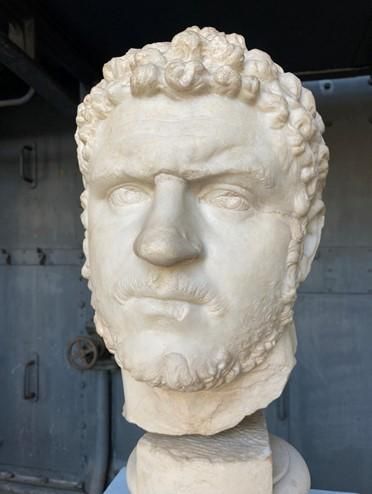The Husband on the Coin: Who is Caracalla?
We call him Caracalla, but that's actually not his real name. His official name as emperor was Marcus Aurelius Antoninus. He used this name to place himself in the dynastic tradition of the popular emperor Marcus Aurelius. Caracalla's father Septimius Severus had already done this to legitimize his rule. He simply declared himself to be Marcus Aurelius' son. However, neither of them were really related to him. The name Caracalla is a nickname. Caracalla is actually the name of a cloak with a hood that he had designed himself. The name was probably established during his sole rule.
Caracalla’s reign lasted from 198 until his death in 217. He became co-ruler with his father, Septimius Severus, in 208 and was joined by his younger brother, Geta, in 209. They co-ruled together briefly after their father’s death in 211, before Geta also died (probably murdered by Caracalla himself). For the remainder of his life Caracalla ruled the Roman Empire alone.
On this coin, Caracalla is standing on the right and wearing a so-called toga. This robe helps us identify him, as it is only worn by Roman men. A further hint towards identifying him is that he is wearing a laurel wreath, which emperors, such as Caracalla, often wear on coins.
Nevertheless, clothing doesn’t tell us what kind of emperor he was. Among the senators, he is known as a cruel emperor, because he murdered his brother and because he took very strict measures against anyone who was, or who he thought to be, against him. Nonetheless, he was very popular in the army, first and foremost because he doubled their pay. For the general people, he did something good as well. He issued an edict called the Constitutio Antoniniana, which granted Roman citizenship to all free male inhabitants of the Roman Empire. Ultimately, he was killed in 217 during a campaign against the Parthians, who lived in modern-day Iraq.
Could we say then that Caracalla was a cruel emperor but honored among the soldiers for his money and among the common people for reformation? Does this give us a hint how he treated his wife? We’ll see in the next steps!
